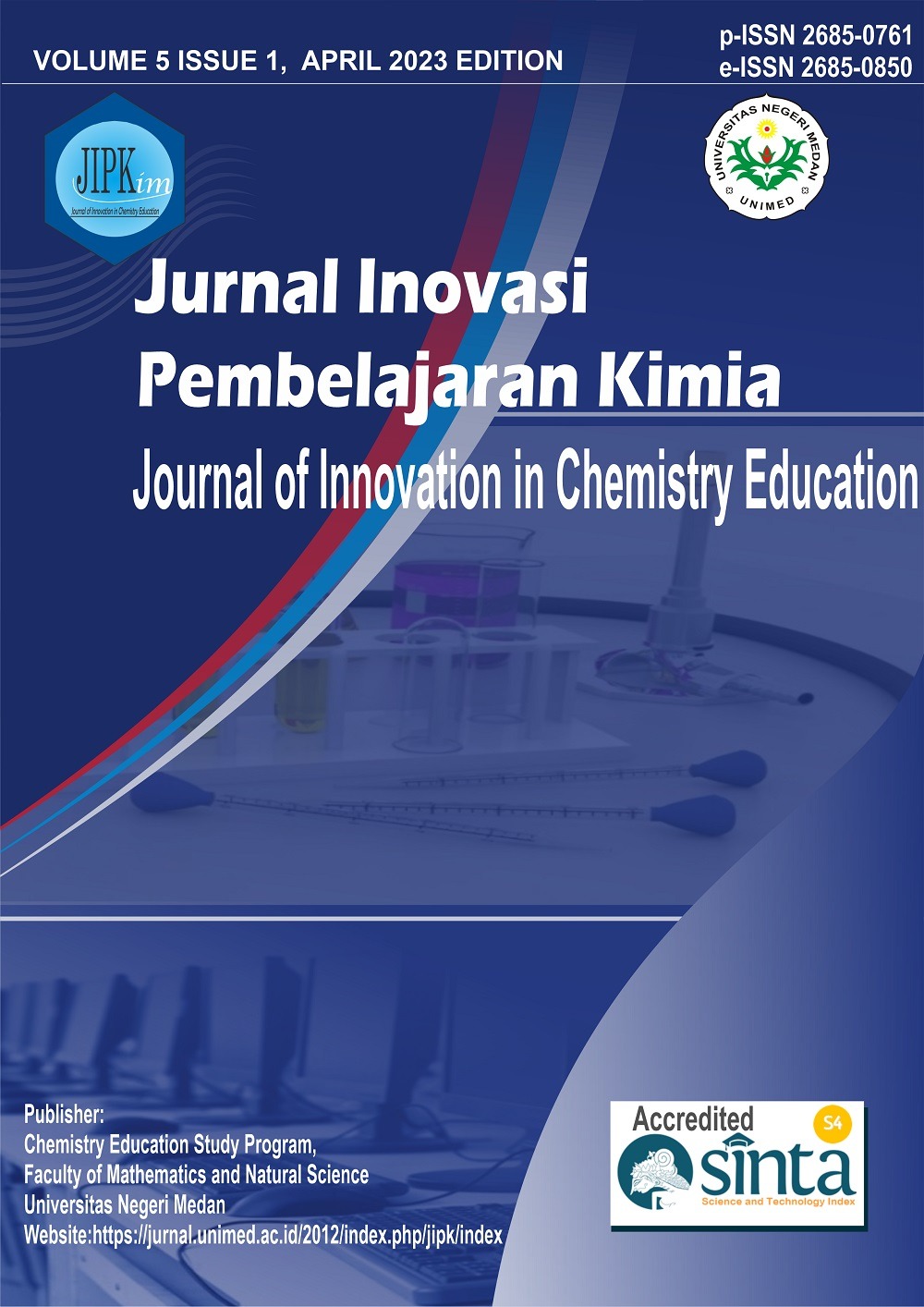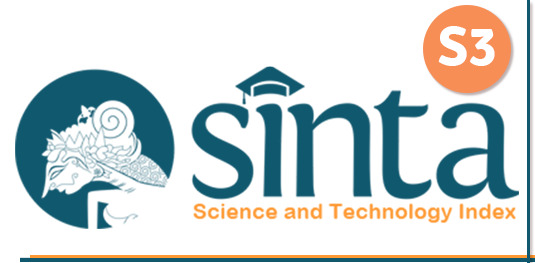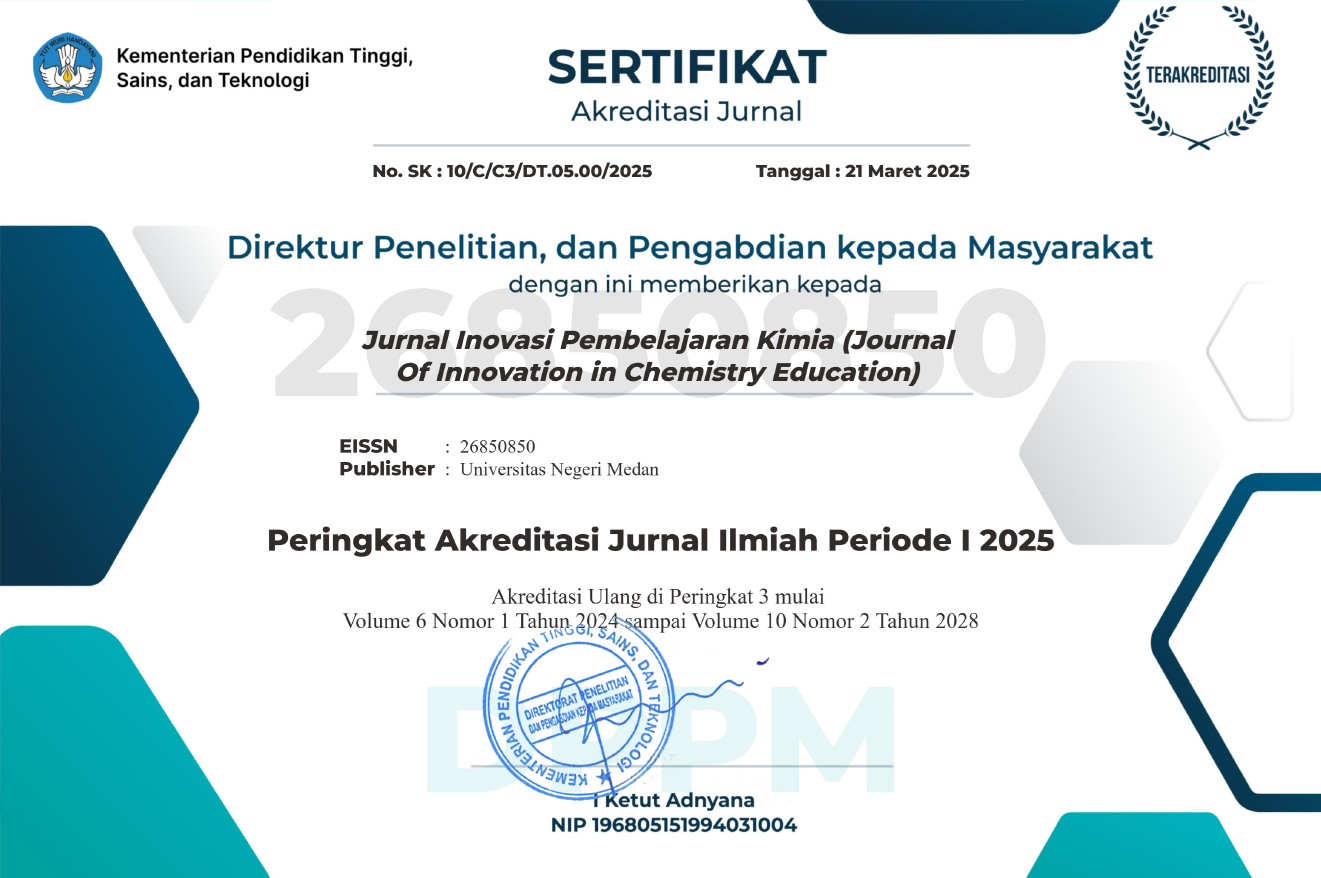Effects of Implementing Innovative Character Integrated Chemical Bond Modules to Improve Learning Outcomes and Character
DOI:
https://doi.org/10.24114/jipk.v5i1.33664Keywords:
module, chemical_bond, character, learning_outcome.Abstract
For this study aims to determine the effect of an innovative chemical bond module integrated with characters that have been developed to improve student learning outcomes and character. The samples in this study were three chemical bonding textbooks, two chemistry education lecturers as expert validators, and 20 chemistry education students. book so that it needs to be developed, (2) The results of the lecturer's assessment of the innovative chemical bonding book integrated with characters obtained an average of 3.70 which means that it is valid and does not need revision so that it can be used in chemistry learning. (3) There is an influence on student learning outcomes who are taught using an innovative chemical bonding book that integrates characters with students who are taught using the textbook used, according to the data from the hypothesis test results obtained a significance of 0.002 < 0.005, (4) The innovative chemical bonding book is integrated characters that have been developed can develop character values in students with an average of 85.53% in the very good category.References
Arifin, Z., Yanti, F., Silaban, R., & Tarigan, S. (2019). Analisis Buku Penuntun Praktikum Kimia Kelas XII Semester I Berdasarkan Kurikulum 2013. Talenta Conference Series: Science and Technology (ST), 2(1), 253“258. https://doi.org/10.32734/st.v2i1.352
Pratiwi, I., Ismanisa, I., & Wahyu Nugraha, A. (2019). Development of guided inquiry based modules to improve learning outcomes and metacognition skills of student. Jurnal Pendidikan Kimia, 11(2), 49“56. https://doi.org/10.24114/jpkim.v11i2.14462
Rupa, J. N., & Sumbi, A. K. (2021). EDUKATIF : JURNAL ILMU PENDIDIKAN Pengembangan Bahan Ajar Menulis Cerpen dengan Pendekatan Saintifik untuk Siswa Sekolah Menengah Pertama. 3(6), 3602“3616.
Simangunsong, A. D. (2020). The Effect of Discovery Learning Model Using Concept Map and Computer Animation on Student Learning Outcomes in Hydrocarbon Material. ¦ Journal of Education and Curriculum ¦, 3(2), 130“135. http://journal.ummat.ac.id/index.php/IJECA/article/view/2692
Simangunsong, A. D. B., & Pane, E. P. (2021). Pengembangan Modul Kimia Dasar Berbasis Discovery Learning pada Materi Stoikiometri. Edukatif: Jurnal Ilmu ¦, 3(6), 4415“4425. https://edukatif.org/index.php/edukatif/article/view/1472
Situmorang, M. (2013). Pengembangan Buku Ajar Kimia SMA melalui Inovasi Pembelajaran dan Integrasi Pendidikan Karakter untuk Meningkatkan Hasil Belajar Siswa. Semirata FMIPA Universitas Lampung, 1(1), 237“246.
Wartika, S., Muchtar, Z., & Hutabarat, W. (2021). The development of learning modul of colloid system integrated with project based learning (PjBL) system to increase the result of students™ learning. Jurnal Pendidikan Kimia, 13(1), 78“84. https://doi.org/10.24114/jpkim.v13i1.24147
Wijaya, J. E., & Vidianti, A. (2020). The Effectiveness of Using Interactive Electronic Modules on Student Learning Outcomes in Education Innovation Course. 422(Icope 2019), 86“89. https://doi.org/10.2991/assehr.k.200323.096
Winoto, Y. C., & Prasetyo, T. (2020). Efektivitas Model Problem Based Learning Dan Discovery Learning Terhadap Kemampuan Berpikir Kritis Siswa Sekolah Dasar. Jurnal Basicedu, 4(2), 228“238. https://doi.org/10.31004/basicedu.v4i2.348
Yanti, F. (2021). EDUKATIF: JURNAL ILMU PENDIDIKAN Pengembangan Bahan Ajar Inovatif Berbasis Saintifik pada Materi Analisis Gravimetri. Jurnal Ilmu Pendidikan, 3(6), 4263“4273. https://doi.org/10.31004/edukatif.v3i6.1433
Yanti, F., Penuntun, B., & Dasar, K. (2020). Analisis Buku Penuntun Kimia Dasar Mahasiswa Semester I Tahun Ajar 2019-2020. 2(x), 6“15.
Zakaria, L. M. A., Purwoko, A. A., & Hadisaputra, S. (2020). Pengembangan Bahan Ajar Kimia Berbasis Masalah Dengan Pendekatan Brain Based Learning: Validitas dan Reliabilitas. Jurnal Pijar Mipa, 15(5), 554. https://doi.org/10.29303/jpm.v15i5.2258













